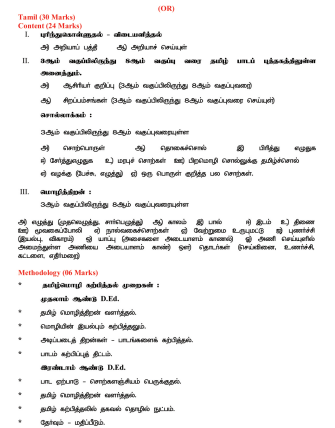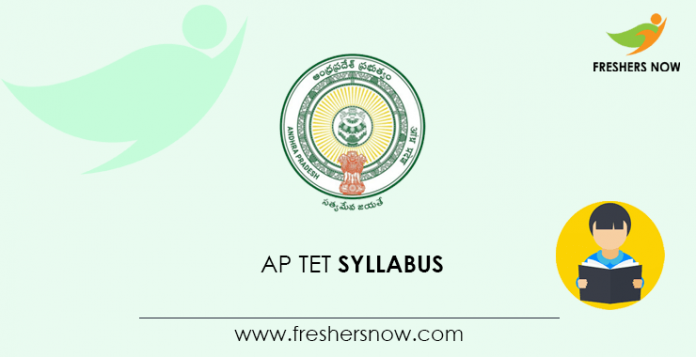
AP TET Syllabus 2025 | New Exam Pattern 2025: This article is useful for candidates who are preparing for the Andhra Pradesh Teacher Eligibility Test (AP TET). Aspirants can easily download the AP TET Syllabus 2025 In Telugu and Test Pattern in PDF format through the link provided at the end of this article. Further, we have given detailed information about AP TET Paper 1, 2 Syllabus for SGT & AP TET Paper 1, 2 as per the official information. Aspirants can also visit the Andhra Pradesh TET official site @ aptet.apcfss.in to get more details about the Andhra Pradesh TET Syllabus, and Exam Pattern.
AP TET Syllabus 2025
Andhra Pradesh TET Exam 2025 will be a Computer Based Test. There will be 150 MCQs (Multiple Choice Questions) in the AP TET Exam 2025. The duration of the AP TET Exam 2025 is 2 Hours 30 minutes. Aspirants can save this Exam Pattern by downloading the Andhra Pradesh TET Exam Syllabus 2025 PDF at the end of the page.
AP TET Syllabus 2025 – Overview
| Latest AP TET Syllabus & Exam Pattern | |
| Organization Name | Commissioner of School Education Andhra Pradesh Teacher Recruitment Board |
| Test Name | Andhra Pradesh Teacher Eligibility Test (AP TET) |
| Category | Syllabus |
| Selection Process | Written Test |
| Location | Andhra Pradesh |
| Official Site | aptet.apcfss.in |
AP TET Exam Pattern 2025
There will be two papers in the AP TET Exam 2025 ( Paper – I & Paper II). Paper I is for those applicants who will be recruited as Primary Teachers ( Class I to V) and Paper – II is for those applicants who will be recruited as Elementary Teachers ( Class VI to VIII).
The AP TET Exam 2025 will be conducted in Bilingual ( English & Other language is chosen by the candidates except for Sanskrit. Candidates who chose Sanskrit will get Question Paper in Telugu medium & Sanskrit).
AP TET Paper 1 A Exam Pattern 2025
| Subject Name | Questions | Marks |
|---|---|---|
| Child Development & Pedagogy |
30 | 30 |
| Language I (Telugu/ Urdu/ Hindi/ Kannada/ Tamil/ Odiya) | 30 | 30 |
| Language II (English) | 30 | 30 |
| Mathematics | 30 | 30 |
| Environmental Studies |
30 | 30 |
| Total | 150 Questions | 150 Marks |
AP TET Paper 1 B Exam Pattern 2025
| Subject Name | Questions | Marks |
|---|---|---|
| Child Development & Pedagogy | 30 | 30 |
| Language I (Telugu/ Urdu/ Hindi/ Kannada/ Tamil/ Odiya)) | 30 | 30 |
| Language II (English) | 30 | 30 |
| Mathematics | 30 | 30 |
| Environmental Studies |
30 | 30 |
| Total | 150 Questions | 150 Marks |
AP TET Paper 2A Exam Pattern 2025
| Subject Name | Questions | Marks |
|---|---|---|
| Child Development & Pedagogy |
30 | 30 |
| Language I | 30 | 30 |
| Language II (English) |
30 | 30 |
|
60 | 60 |
| Total | 150 Questions | 150 Marks |
AP TET Paper 2B Test Pattern 2025
| Subject Name | Questions | Marks |
|---|---|---|
| Child Development & Pedagogy |
30 | 30 |
| Language I (Telugu/ Urdu/ Hindi/ Kannada/ Tamil/ Odiya/ Sanskrit) |
30 | 30 |
| Language II (English) | 30 | 30 |
| Category of Disability Specialization and Pedagogy | 60 | 60 |
| Total | 150 Questions | 150 Marks |
Andhra Pradesh TET Syllabus 2025 (Subject Wise)
Here, we have described in complete detail the AP TET Syllabus 2025. For the sake of candidates, we have listed the sub-topics that will be questioned in the Andhra Pradesh TET Exam 2025.
AP TET Syllabus 2025 for Child Development & Pedagogy
1. Development, Growth & Maturation — Concept & Nature, Differences between Growth and Development :
- Principles of development and their educational implication
- Factors influencing Development — Biological, Psychological, Sociological,
- Dimensions of Development and their interrelationships – Physical & Motor, Cognitive,
- Emotional, Social, Moral, and Language relating to Infancy, early Childhood, late Childhood,
- Understanding Development — Piaget, Kohlberg, Chomsky, Carl Rogers, Erikson
- Individual differences — Concept, Types of individual differences (Intra & inter) Factors of individual differences ( heredity & environment).
- Factors influencing individual differences in the areas of Attitudes, Aptitude, Interest, Habit, intelligence, creativity, Values, level of aspiration, self-concept,
- A) Intelligence: Concept and meaning of intelligence, Definitions, Types of intelligence, Theories of Intelligence, Measurement of intelligence, IQ, Classification of IQ, Types of Intelligence tests and
- Aptitude: Concept and meaning of aptitude, Definitions, Characteristics of aptitude, Aptitude tests Measurement of aptitude, Uses of aptitude
- Interest: Concept and meaning of interest, Definitions, Characteristics of interest, Measurement of How to develop interest among students – the role of teacher.
D)Attitude: Concept and meaning of attitude, Definitions, Characteristics of attitude, Attitude scales, Measurement of attitudes. How to develop positive attitudes among children of the teacher.
- Creativity: Concept and meaning of creativity, Definitions, Characteristics and stages of
creativity, assessment of creativity, The role of a teacher in fostering creativity among the children
- Thinking: Concept, Meaning, Definition, types of thinking, characteristics of thinking, factors of thinking, classroom
- Reasoning: Concept, Meaning, Definition, Characteristics, Reasoning process, types of reasoning classroom
- Metacognition:- Meaning, Concept, Nature, uses, Aspects in metacognition process, experimental learning.
- Development of Personality – Meaning and concept of personality, definitions, characteristics, elements and factors of personality, theories of personality, assessment of personality(Projective and Non-Projective)
- Mental health, adjustment & behavioral problems, conflicts, frustration, tension, anxiety, mall adjustment, defense
- Methods and Approaches of Child Development Introspection, Observation, Interview, Case Study
- Experimental, Cross-sectional, and Longitudinal Developmental tasks and
2. UNDERSTANDING LEARNING
- Learning – Meaning, Concept, Definitions, Characteristics of Learning, Types of Learning, determinants of learning, Readiness, Maturity & Motivation, Learning
- Factors of Learning — Personal and Environmental
- Dimensions of Learning — Cognitive, Affective and Psycho –
- Motivation and Sustenance —its role in
- Concept: Meaning, Definition, Formation of concept, Classification of concept, Types of concept, Concept Development, Role of teacher in conceptual
- Perception:- Concept, Meaning, Definitions, process of perception, Characteristics, Laws of perceptual organization, Influencing factors of
- Memory & Forgetting
- Transfer of Learning
Approaches to Learning and their applicability. A): Behaviorism(Skinner, Pavlov, Thorndike B): Gestalt(Kohler, Koffka) C): Observational(Bandura) D): Constructivism(Piaget, Vygotsky) E): Bruner’s theory of instruction, Experimental learning
3. PEDAGOGICALCONCERNS
- Teaching and its relationship with learning and
- Learners in Contexts: Situating learners in the socio-political and cultural context
- Children from diverse contexts — Children With Special Needs (CWSN), Inclusive
- Understanding of pedagogic methods — Inquiry-based learning, Project-based learning, Survey, Observation and Activity-based learning, Cooperative and collaborative Individual and Group learning.
- Issues and concerns concerning organizing learning in the classroom like Study habits, Self-learning, and Learning to learn Skills.
- Organizing learning in heterogeneous classroom groups Socio-economic background
- Abilities and
- Paradigms of organizing centric, Subject, and Learner
- Theory of instruction – Bruner
- Teaching as Planned Activity — Elements of Planning
- Phases of Teaching — Pre-active, Interactive, and Post active
- General and Subject related skills, competencies required in teaching, and attributes of good
- Learning Resources — Self, Home, School, Community,
- Classroom Management: Role of a student, teacher, the Leadership style of teacher, Creation of on threatening learning environment, Managing behavior problems, Guidance & Counseling, Punishment, and its legal implications, Rights of a child, Time
- The distinction between Assessment for Learning & Assessment of Learning
ICT-A
- The Concept of ICT, Tools
- Computer Hardware, Internet, Text Documents, Spread Sheets,
- Open Education Resources, Handheld devices, Netiquette (Etiquettes in the use of the Internet)
- ICT – National and State Policies
- ICT-based learning process – Creation of learning Environment, Educational
- Self Exercise
ICT -B
- Exploring for ICT resources (Hardware, Software) evaluating and adopting of ICT
- Pedagogy – Analysis: integrating with ICT and teaching
- Cyber law and protection free software
- Integrating ICT in the Assessment of portfolios, rubrics, and data
- Preparation of multimedia lessons in subjects and planning
- Activities to be conducted in multimedia lessons, the role of the teacher before, during, and after multimedia lessons, social media, and their role in
- Online learning courses for teachers’ professional development
- Open education resources, ICT platforms and
- Assessment, Continuous Comprehensive Evaluation: Perspective &
- Understanding teaching learning in the context of NCF, 2005 & Right to Education Act,
- NEP– 2020 – Introduction, ECCE, Teacher
- New Policies and Programmes implemented by AP., Government.
AP TET Syllabus For Telugu
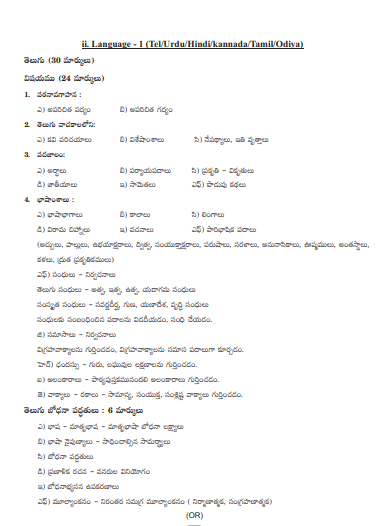
AP TET Syllabus for Urdu
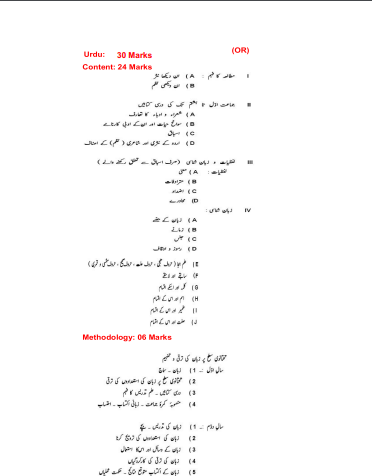
AP TET Syllabus For Hindi
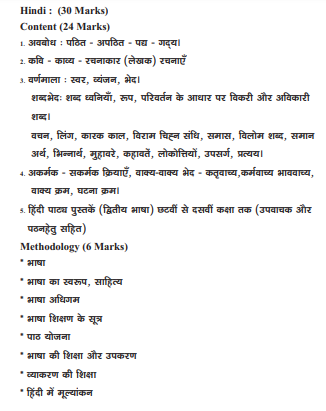
AP TET Kannada Syllabus
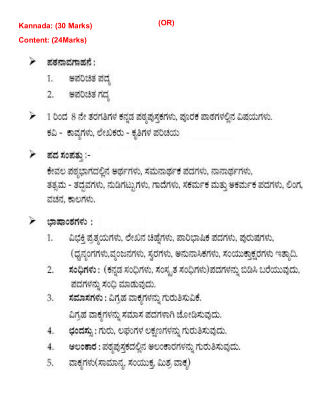
AP TET Methodology Topics
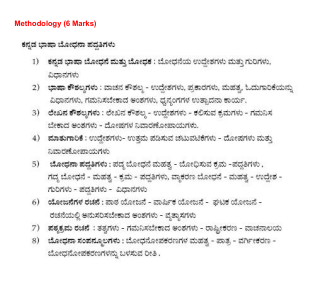
AP TET Tamil Topics
AP TET Odiya Topics
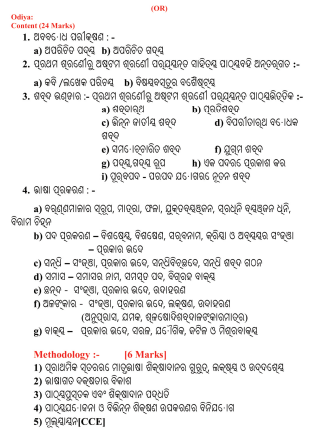
AP TET English Topics
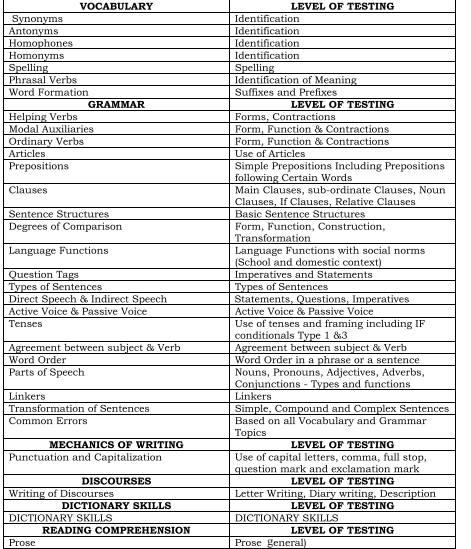
AP TET Syllabus for Mathematics
I. Numbers:
Numbers – four fundamental operations ( addition, subtraction, multiplication, division) -Knowing our Numbers & International system – Prime and composite numbers of numbers – Whole Numbers-Playing with Numbers – Divisibility rules – Factors- Methods of prime factorization-Co- primes- twin primes- LCM-HCF- negative numbers- integers-Fractions-Decimals- Rational Numbers- Squares- Cubes- Square Roots and Cuberoots-Profit and Loss.
II. Measurement:
Length -Weight -Capacity -Time -Money – Area and Perimeter of Triangle- Square-Rectangle- Rhombus- Circle- Trapezium- Parallelogram – The perimeter for square and rectangle through pattern – Surface area and volume of Cube and Cuboid
III. Geometry :
Naming of the given figures and Parts of 2D figures of Triangle, Square and Rectangle -Identification and counting of Edges- Corners- Faces (3D figures)-Introduction of Perimeter and Area of given shapes- Geometrical patterns (TANGRAM)-Introduction of circle- center, diameter and radius-Primary Geometry concepts (Point, straight line, line segments, ray)-Types of angles (Right, Obtuse & Acute angles)-Open & closed figures- Symmetry- line symmetry & rotation symmetry (1/2,1/4 )- Picture patterns- Area and Perimeter- Lines and Angles,-Triangle and its properties – Congruency of Triangles- Quadrilaterals- Practical Geometry- Construction of Traingles-Construction of Quadrilaterals- Exploring Geometrical Figures.
IV. Data Handling:
Reading and interpreting the Data (Bar graphs, picto graphs)- Analysis of the data with tallymarks- Collection & organisation of data -Representation of Data .
V.Algebra:
Patterns – making rules-Introduction of variables – Expressions with variables & Rules-Number forms of even and odd(2n,2n+1)- Introduction to unknowns- Simple equations – Algebric expressions- Exponents & Powers- Linear Equations in one variable-Factorization.
VI.Arithmetic:
Comparing quantities using proportion -Concept and applications of ratio- proportion of equality ratios – Unitary method- Understanding ratios & Proportions – Direct and Inverse proportion. Mathematics Methodology (D.El.Ed.)
- Nature and Definitions of Mathematics
- Aims, values and instructional objectives of teaching Mathematics
- Methods of Teaching & Remedial measures in Mathematics
- Instructional Material, TLM and Resource Utilization in Mathematics
- Curriculum, Text Book & Instructional Planning.
AP TET Syllabus for Environmental Studies
1. Living World
Non Living and living Organisms – Plants and Animals- Classification of plants- Plant – Parts and Functions – Flower to seed- Seed Germination- Diversity in Plants- Life cycle of a plant- food for plants- Animals around us- Classification of animals- Group behavior of animals- Animals diversity (based on ecological conditions)-movements in animals- animal husbandry-Family – Changing family structure – family life -usage of home appliances- Methods of Agriculture – Traditional, Modern, Organic-Agriculture &Tools-economy- Agricultural operation – Cultivation of Crops- diseases to plants and control- improvement of crop yield storage- Preservation and protection of food and plant products- Hybridization
Climate change – drought, deforestation, ecosystem- Weather- Climate- Soil our life- rain- floods- Cyclones- disaster management
Air – Importance of air-composition of air- atmospheric pressure- diseases spread through air and their prevention-air pollution – causes, its impact and measures to prevent- Green House effect
Water – Forms of water -Water resources – Rivers, lakes, canals in A.P and India- How to save water- Need and Importance of water- methods of water conservation- Process of producing and procuring water – Water cycle – ways to keep water resources hygienic- Story of river Krishna- Major rivers in AP- Reasons behind river pollution and its adverse effects- drought and floods- Rain water harvesting -Shelter – Importance of shelter- the places of living in neighbourhood- types of houses- Homeless people- Diversity of shelters depending on climate-Homes of Animals , Insects and Birds- Concern for animals and birds- Organisms and Habitat- Classification of living organisms- Story of microbial world-Useful and harmful micro organisms- Why do we fall ill?- Branches of Sciences- Recent trends in Science- Games and Recreation.
2.Life processes :
Our Body – Body parts – Sense organs – functions – care & safety measures,-Human body systems,-Major organ systems- FirstAid- Movement and Locomotion – Functions of muscles and bones- Different types of joints- Cartilage,tendon and ligament- Process of movements in animals- Locomotion in birds, snakes,fish and snails- Nutrition in Plants- Cell,cell organelles- parts of plants and functions- Nutrition in plants and animals- excretion-respiration control and coordination-reproduction- seed dispersal in plants- control and coordination in organisms- Our food-Foods available around us – Food from plants and animals- Need of food- Mid-Day Meal- Process of cooking food and preservation- Different food items- Food ingredients- Methods of preparing food- Tasty Food- Food habits- food components- Nutritious food-Health- Cleanliness- Balanced diet- Malnutrition- Food Pyramid- Junk food- Good Touch and Bad Touch
3. Natural Phenomena :
Materials – classification of materials-separating methods – Magnets – Playing with magnets- Measurements -Different measuring instruments- Standard units of measurements- Precautions while measuring -Fabrics -Different types of fabrics- Characteristics and uses- Changes around us- separation of substances –Plastics, metals, and nonmetals- matter- Acids and bases- Motion and time- Energy- Forms of Energy – Energy resources- Renewable and nonrenewable resources-conservation of energy -Temperature and its measurement- Electricity- Electric circuits- Current and its effects- Sound- reflection of light- Shadows- friction- force- speed- velocity- combustion- fuels and flame- How to measure things- Coal- Petrol- Petroleum products.
4. Transportation and Communication:
Transportation –Objects- signs and signboards used for transport- Places associated with transport- Modes of travel in the present and the past- Methods of transport in different topographical conditions- Need for an international transport -Import and export of the goods- different means of transport of goods- Importance of tourism and seven wonders of the world- How communication and transport brings the entire world together-Means and objects of Communication- Types of Communication both in Human and Animals ( different feelings and gestures) Modern forms of communication- Communication used in the past and present- Advantage of Mass Communication- Communication through Postcard, Cell Phone and Internet etc.,
5. Professions and Services:
Household materials concerning profession (farmer, cobbler, tailor, etc)-Different professions and their need to the society- villager/ farmer (seeds/ manure/ agri methods, etc.,), helping agents ( bank, e- seva, PHC, panchayat office, post office/etc.,)
6. Our Environment:
Biodiversity- Diversity in plants and animals- let’s plant- trees- endangered, endemic species- Forest
- Tribes – Tribal life – diversity in forests- Different Ecosystems- Ecology- Bio mass- Abiotic, Biotic factors- Global Environmental Issues-Global warming- Acid rains- depletion of the Ozone layer- Stars and Solar systems- River- Lively hood- Atmosphere – wind – safety measures – Historical sites –Our Country World, Our constitution, Child rights
Methodology: (3 Marks)
- Concept and scope of Environmental Studies (Science)
- Aims & Objectives of Teaching Environmental Studies (Science)
- Academic Standards of Teaching EVS Relation to Science
- Curriculum and its transactional process –Teaching Methodology
- Teaching Learning Material (TLM)
- Evaluation procedures – CCE.
AP TET Syllabus for Social Studies
Theme – I: Our Universe:
Neighbors and Neighbourhood -Sides, directions and Corners- Landmark Symbols-understanding the Maps- Globe – A Model of the Earth- Identifying the Continents and Oceans on the Globe- latitudes and Longitudes – Earth Movements and Seasons – Geographical Structure of the Earth and its Diversity- Land Forms of Andhra Pradesh -Rain and Rivers-Tanks and Ground Water – Oceans and Fishing – Continents – Europe – Africa –The Polar Regions – Forests: Using and Protecting them – Minerals and Mining- Solar System – Celestial bodies like Sun, Moon and Stars.
Theme – II: Production Exchange and Livelihoods
From Gathering Food to Growing food – The Earliest People – Early Civilization – Handicrafts and Handlooms – Industrial Revolution – Production in a Factory – A Paper Mill – Importance of Transport System – Safety measures – Money and Banking – Impact of Technology on Livelihoods – Public Health and the Government
Theme -III: Political Systems and Governance
Emergence of Kingdoms and Republics – First Empires – Government – Village Panchayats – Local Self Government – Kingdoms and Empires – The Kakatiyas – Emergence of a Regional Kingdom – The Kings of Vijayanagara – Mughal Empire – Establishment of British Empire in India – Landlords and Tenants
under the British and the Nizam – National Movement – The Early Phase 1885-1919 – National Movement – The Last Phase 1919- 1947 – Freedom Movement in Hyderabad State -The Indian Constitution – Parliament and Central Government – Making of Laws in the State Assembly – Implementation of Laws in the District – Law and Justice.
Theme -IV: Social Organisation and Inequities
Diversity in Our Society – Towards Gender Equality -Caste Discrimination and the Struggle for Equalities – Livelihood and Struggles of Urban Workers – Abolition of Zamindari System – Understanding Poverty – Rights Approach to Development
Theme – V: Religion and Society
Religion and Society in Early Times – Devotion and Love towards God – Folk – Religion – Devotional Paths to the Divine – Social and Religious Reform Movements – Understanding Secularism
Theme -VI: Culture and Communication
Language, Writing and Great Books – Sculptures and Buildings – Rulers and Buildings – Performing Arts and Artistes in Modern Times – Film and Print Media – Sports: Nationalism and Commerce.
Methodology: 03 Marks
- Nature and Scope of Social Studies
- Aims, Objectives and Values of Teaching Social Studies
- Methods of Teaching Social Studies
- Resource Utilization, Content Enrichment material
- Curriculum, Text Book and Instructional Planning
- Evaluation and Continuous Comprehensive Evaluation
AP TET Category of Disability Specialization and Pedagogy Syllabus
- AUTISM SPECTRUM DISORDERS
- HEARING IMPAIRMENT
- LEARNING DISABILITY
- MENTAL RETARDATION / INTELLECTUAL DISABILITY
- MULTIPLE DISABILITIES
- VISUAL IMPAIRMENT
★★ Practice English Questions & Answers ★★
Note: The above-given syllabus is only for the sake of your reference, for a detailed syllabus and exam pattern refer to the official notification.
AP TET Syllabus 2025 Download Link
| AP TET Syllabus 2025 Download Link | |
|---|---|
| AP TET Syllabus & Exam Pattern PDF Download | Download Syllabus |
Bookmark our website FreshersNow for more latest updates about the AP TET Exam 2025 & Syllabus.




